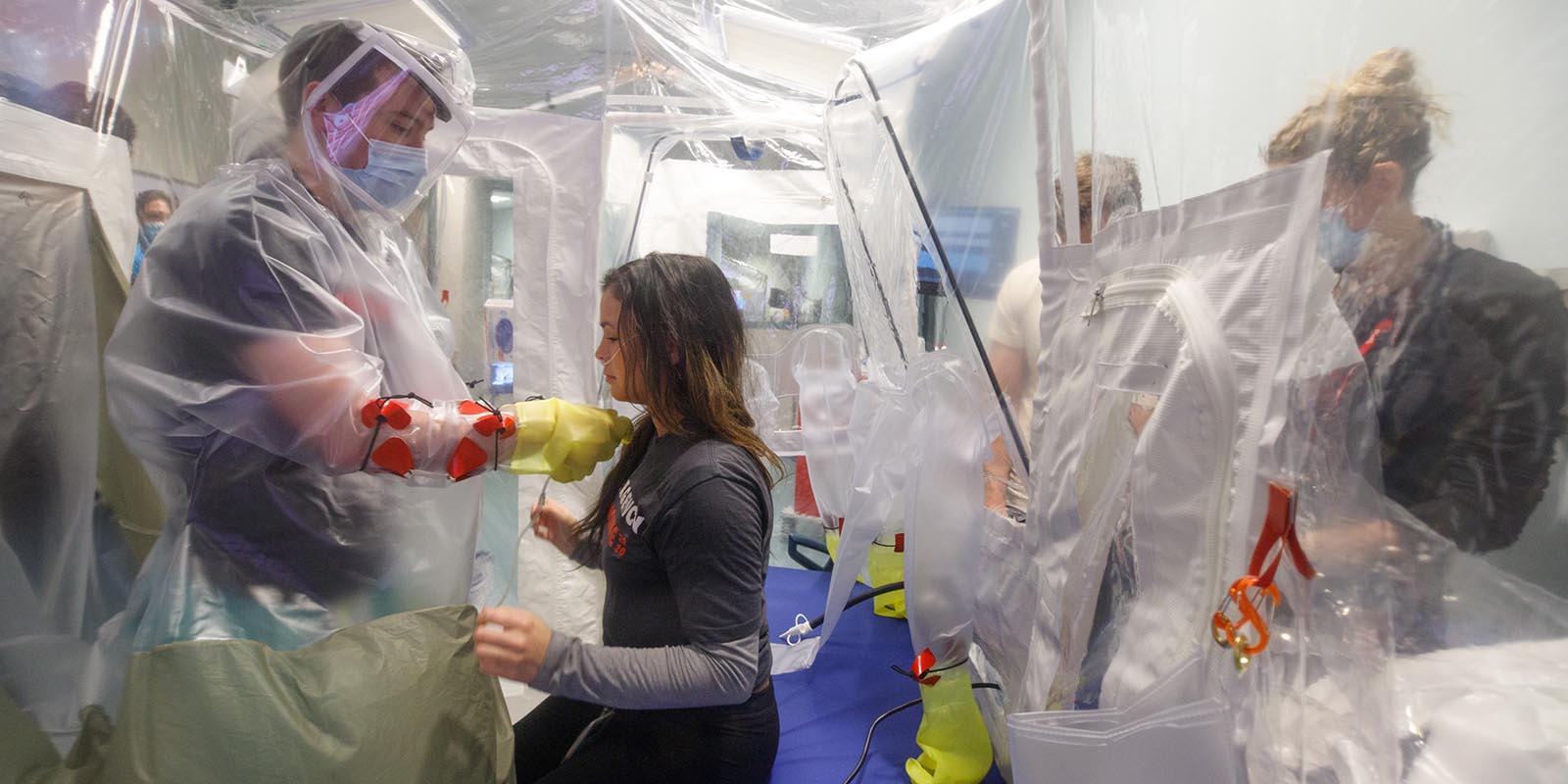
Core Programs
The GCHS works with multiple core programs including Region VII Disaster Health Response Ecosystem (R7DHRE), Strengthening Healthcare Infection Prevention and Control (SHIPC), D-SAFE Public Health Training Service, the National Disaster Medical System Pilot Program (NDMS), the GCHS Ethics Advisory Committee, the Training, Simulation, and Quarantine Center (TSQC), the Center for Sustainment of Trauma and Readiness Skills (C-STARS), the Region VII Emerging Pathogen Treatment Center (RESPTC), and the National Emerging Special Pathogens Training and Education Center (NETEC).
Some of these innovative programs are funded by key organizations such as the Centers for Disease Control and Prevention (CDC), Administration for Strategic Preparedness and Response (ASPR), and Uniformed Services University (USU). Together, we are enhancing our capabilities to respond effectively to public health challenges.
Stay informed about how these initiatives are making a difference in our community. Learn more below.
Core Programs
Center for Sustainment of Trauma and Readiness Skills (C-STARS)
The Center for Sustainment of Trauma and Readiness Skills, or C-STARS, in Omaha, Nebraska, is a medical training program offered through the United States Air Force School of Aerospace Medicine (USAFSAM), in partnership with the University of Nebraska Medical Center/Nebraska Medicine. This program was designed to prepare Air Force medical personnel to respond to highly hazardous communicable diseases – infectious diseases that are capable of causing serious illness and spreading from person-to-person – to ensure operational readiness and maintain clinical currency.
Learn MorePublic Health Training Service (D-SAFE)
In 2022, USPHS partnered with the University of Nebraska Medical Center’s (UNMC) Global Center for Health Security (GCHS), the University of Texas Health Science Center at Houston, and Texas A&M University to create and implement the Public Health Service Deployment Safety Academy for Field Experiences (PHS D-SAFE) to train USPHS officers on personal safety and security when deployed to environments with potential for COVID-19 or high-consequence infectious disease (HCID) exposure.
Learn MoreGCHS Ethics Advisory Committee
Our ethics committee initially focused on helping health care institutions analyze and resolve ethical issues involving Crisis Standards of Care during the COVID-19 pandemic. The committee's work has extended to include key bioethics issues within research, clinical, and public health ethics. The committee accepts requests from civic, health care, and professional organizations related to the ongoing COVID-19 pandemic.
Learn MoreNational Disaster Medical System Pilot Program (NDMS)
The National Disaster Medical System Pilot Program is a Uniformed Services University-funded program to strengthen interoperable partnerships across the NDMS to care for the nation’s combat casualties by increasing medical surge capabilities and capacity. The GCHS is working to establish a collaborative network of federal and civilian partners to inform and enhance system-wide medical surge capacity, capability, and interoperability.
National Emerging Special Pathogens Training and Education Center (NETEC)
NETEC's mission is to set the gold standard for special pathogen preparedness and response across health systems in the U.S. with the goals of driving best practices, closing knowledge gaps, and developing innovative resources. Over the past two years, NETEC has initiated work to redefine the tiered structure nationally through the National Special Pathogens System of Care (NSPS).
Learn MoreNational Infection Control Strengthening (NICS)
Funded by the Centers for Disease Control and Prevention (CDC), the University Nebraska Medical Center, in partnership with Nebraska Medicine, was selected as an innovation partner as part of Project Firstline with a focus on strengthening infection prevention and control programs in healthcare facilities in underserved areas to develop innovative programs, services, and product development strategies to strengthen IPC nationally and globally.
Learn MoreRegion 7 CDC Center
UNMC was recently awarded the PHPR Center in Region 7 (R7) (IA, KS, MO, NE). Specifically, the University of Iowa College of Public Health will be a partner on the project. The center will work with a coalition of regional partners, including local and tribal public health departments, healthcare coalition coordinators, state leaders and private industry leaders.
Learn MoreRegion VII Disaster Health Response Ecosystem (R7DHRE)
The goal of this project is a flexible, self-organizing R7DHRE that provides a grassroots readiness network during disasters, and includes the following specialty teams: behavioral health, biological, burn, chemical, pediatric, radiological, and trauma. This is one of two demonstration projects nationwide charged by the Administration for Strategic Preparedness and Response (ASPR).
Learn MoreRegion VII Emerging Special Pathogen Treatment Center (RESPTC)
The Nebraska Biocontainment Unit (NBU) has led the nation in special pathogen preparedness and response. Today, as the Regional Emerging Special Pathogens Treatment Center, for HHS Region VII (RESPTC), our goals and priorities have grown to assist the facilities around us to ensure their preparedness. This assistance comes through numerous modalities: educational videos, webinars, workshops, infographics, targeted technical assistance, and exercises. The RESPTC is still committed to delivering high quality care for patients with highly hazardous communicable diseases and sharing our knowledge and expertise.
Learn MoreStrengthening Healthcare Infection Prevention and Control (SHIPC)
Funded by the Centers for Disease Control and Prevention (CDC), the University of Nebraska Medical Center, in partnership with Nebraska Medicine, was selected as part of the competitive application process to accelerate work initiated with the original NICS award. SHIPC continues our focus on targeting innovation to vulnerable aspects of our healthcare system that face persistent challenges in infection control outcomes.
Learn MoreTraining, Simulation & Quarantine Center (TSQC)
This $20 million HHS-funded capability includes a 20-bed National Quarantine Unit, a Biocontainment Unit Training Center, and an Emergency Operations Center (EOC) and multipurpose room for incident management training and skills training. The NQU at UNMC/GCHS is the only federally funded resource of its kind; it is specifically designed to provide quarantine services to individuals exposed to highly hazardous communicable diseases.
Learn More